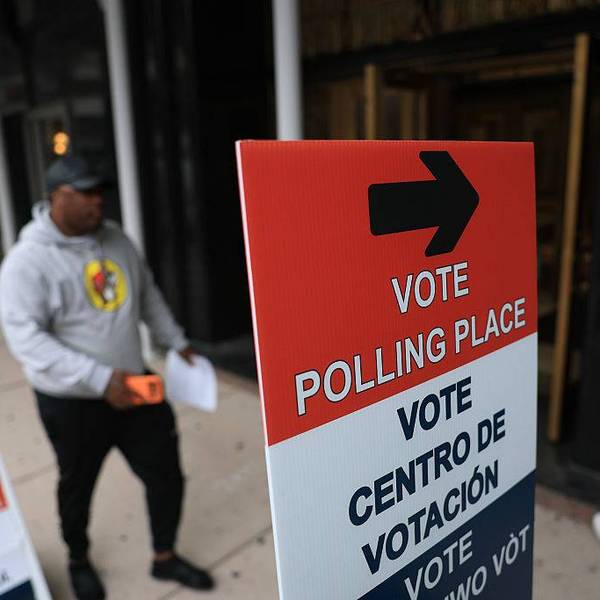Hillary Clinton's new book, entitled What Happened, has been raising quite a brouhaha among Democrats. The general consensus is that most wish she'd just go away, with many saying she's sapping energy and attention at a time when the party should be forging unity and looking forward.
Actually, the title would be more accurate if it were What Happened? Because it's obvious from reading it she hasn't a clue.
But the book could serve a useful purpose, albeit not the one Clinton intended.
Her attack on Sanders could finally force a reckoning between the "centrist" corporate wing of the party and the progressives that the mainstream neoliberals who run the party have desperately tried to avoid.
Clinton's book--besides teeing up a self-serving list of excuses and blame--is a spirited defense of the centrist strategy that has been causing Democrats to lose for decades now, and an implicit warning to the party against following Sanders' progressive agenda.
Let's examine some of her assumptions because they are representative of the centrist's world view, and they're being used to keep progressives on the back bench.
Assumption # 1: Americans are centrists, and titling too far left will hurt the Party
This particular shibboleth just won't die and it's been one of the reasons Democrats have been losing ground at all levels of government for decades now.
Here's the reality: in study after study, Americans overwhelmingly poll left-of-center on an issue-by-issue basis.
But as a result of a well-funded campaign by corporations and several rich families beginning in the late 1970's, the word "liberal" has become so toxic that even people who hold liberal views on an issue-by-issue basis are loath to identify themselves as liberal.
As a result of the oligarchs' campaign, when you ask Americans to self-identify as liberal, moderate, or conservative, most will call themselves conservative. For example, a recent poll Gallup found that 36 percent of Americans self-identified as conservative; 34 percent called themselves moderates; and only 25 percent considered themselves to be liberal. Earlier polls showed even higher numbers of conservatives, but the disparity persists.
This disconnect between the voters' strong preference for specific progressive policies and how they identify themselves politically has been used by neoliberals to justify keeping the party and its nominees in the political center or to the right of center, Ms. Clinton among them. Indeed, with the exception of social issues and climate, there's little separating neoliberal Democrats from Republicans. Both favor free markets, free trade, small government, austerity, and policies which support corporations, Wall Street and big banks. In Ms. Clinton's case, she also shared the conservative's hawkish defense policies and the bloated budgets they demand.
By 2016, the fallout from these policies - extreme income inequality and jobs that were increasingly exploitative - was being felt by the vast majority of Americans. They were wise to the "trickle-down - job-creator" con that Republicans were running, but they also recognized that Democrats were offering a better brand of rhetoric, but little else.
In short, they were essentially saying "a pox on both their houses." They were looking for a champion for change, and Democrats offered the most status quo candidate and platform possible.
What Sanders did, was to package the individual progressive issues people supported into a coherent and values-based whole, that enabled people to go beyond the labels defined by the Oligarch's branding. It helped that the left adopted a new label that hadn't been smeared - progressive.
Sanders integrity and clarity on the issues and his willingness to be a passionate champion of progressive policies captured the voters' attention and it contrasted with Hillary's same old have-it-both-ways approach to politics and that's what hurt her in the general election. Trump, for all his idiocy, knew enough to run as an outsider and a populist, even if he now governs like a traditional trickle down Republican.
Assumption #2 - Sander's proposals were "unrealistic" and unaffordable.
Clinton likened Sanders proposals to the hitchhiker in the movie Something About Mary who revealed his brainstorm for getting rich - a video called "Seven-minute abs" that outdid the then popular "Eight-minute abs" video. Stiller responds, why not six-minute abs. Hillary says:
We would propose a bold infrastructure investment plan or an ambitious new apprenticeship program for young people, and then Bernie would announce the same thing only bigger. On issue after issue he kept proposing four-minute abs or even no-minute abs. Magic abs.
There's so much wrong with this analogy it's hard to know where to begin, but for starters, Sanders wasn't responding to Clinton's proposals. In fact, he'd been consistently to the left of Hillary for decades. It was Hillary who cynically veered to the left when she saw it was playing well. In a sense, the opponent who hurt her the most wasn't Sanders - it was the Hillary who'd cultivated a moderate image for decades and who even boasted that she was a centrist. Voters were fed up with this kind of patently transparent maneuvering.
She goes on to recite a Facebook post someone sent her, to show how unrealistic and unaffordable Sanders' policies were. Here's the first few lines:
BERNIE: I think America should get a pony.
HILLARY: How will you pay for the pony? Where will the pony come from? How will you get Congress to agree to the pony?
BERNIE: Hillary thinks America doesn't deserve a pony.
Again, this analogy fails any test of reality or relevance. In reality, Clinton was issuing gratuitous assaults on Sanders and his policies, something her many surrogates in the Democratic Party and the elite media buttressed.
In fact, Sanders had detailed (and quite realistic) plans outlining how he would pay for his proposals on his website, and they were extremely popular with the majority of voters. He proposed a financial transactions tax on securities (supported by more than 60% of Americans); eliminating various tax loopholes for the rich and corporations (supported by an overwhelming majority of Americans); eliminating the cap on the payroll tax so that the rich don't get the majority of their income sheltered from the tax (supported by more than 60% of Americans and by 80% if phased in); and sponsoring a modest increase in payroll taxes (it would add about $1.61 a week to the average household) to help pay for his expansive social programs.
The most controversial proposal in Sanders' platform involved his plan to pay for universal single payer health care. He proposed a 2.2 percent increase on payroll taxes for households, and a 6.2 percent match by employers. This would have raised taxes, but it would have also substantially reduced the net amount Americans paid for health care, saving American families thousands of dollars. The average family of four paid $24,671 on health care in 2015.
The bottom line is that Sanders' had a viable plan to pay for his pony and the elements of the plan were extremely popular with the majority of Americans. No doubt he would have had a hard time selling Congress, but he never intended to do that - he was going to sell it to their boss -- the American people. That, by the way, is called leadership.
What really happened was the American people got wise to the same old game being run by the Oligarchs and both Parties, and Hillary was caught still playing the game.
What Hillary, the elite media, the neoliberals and the traditional Republican candidates never figured out was just how disgusted people were by politics as usual.
A study called the Smith Project, released on July 4, 2014 summarized people's dim view of both political parties. Here's one of their findings:
Americans overwhelmingly agree (78%-15%) that both political parties are too beholden to special interests to create any meaningful change.
Here's another observation revealed by the Smith Project:
American voters strongly believe that corruption and crony capitalism are among the most important issues facing our nation--almost equal to jobs and the economy. Political alienation has existed for decades, but it now envelops over three-fifths of all voters. These are the numbers that precede a political upheaval. (emphasis added)
The results of the study were confirmed in the 2014 midterms which had the lowest voter turnout in 70 years, and voters in 1942 had an excuse--many were overseas fighting a war. It was confirmed again in 2016, when voters in 14 states voted for down ballot candidates but left the choice for President blank. In Nevada, which allows for "none-of-the-above," 29,000 voters rejected the choices offered for President.
Hillary Clinton was a classic split-the-difference-Democrat, who tried to thread the needle between retaining the support of the oligarchs, Wall Street, and corporations and appealing to the people. Her husband even had a name for the game--triangulation.
In 2016, the people wanted none of that. What really happened was that people were fed up with needle threaders and triangulators.
If the Democratic Party doesn't realize this and act on it, they will not gain control of the House or Senate in 2018, and they will lose even more ground at the state level. The lame "Better Deal" initiative shows they may be aware of it, but it also shows they are unlikely to act on it and run a campaign based on values that levels the playing field for the average American, frees the party from the oligarchy's hold, and restores faith in government.
The best thing that can be said about Clinton's book is that it provides a window into what the party has been doing wrong for over three decades now.




